Viva ICL for Presbyopia
Korea's First Presbyopia ICL Viva Surgery
we laid the foundation for presbyopia correction in Korea.
In 2024, leveraging extensive research, we introduced the innovative Presbyopia ICL Viva.
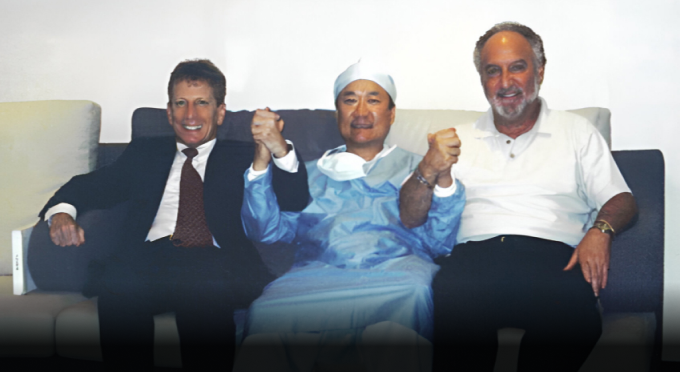
- 2000: Dr. Schachar's surgical team, pioneers of Presbyopia Surgery
(SRP), visited our clinic.
- Chief Director Lee Jong-Ho co-performed presbyopia surgeries with
them.
23 Years of Innovation
Since ICL’s Introduction to Korea
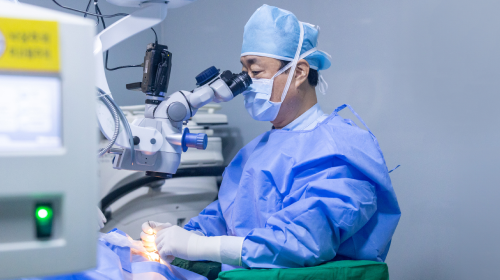
Dr. Jong-Ho Lee led Korea’s first Presbyopia ICL Viva surgery
Presbyopia Surgery Milestones
- First presbyopia surgery with Dr. Schachar’s Team in 2000
-
A wealth of experience through early adoption of various
techniques:
- C-Near Presbyopia Correction
- AMT Presby-LASIK
- Kamra Inlay Presbyopia Lens Implant
- P-LBV Presby-LASIK
- Raindrop Presbyopia Lens Implant
- Presbia Presbyopia Lens Implant and more.
- 2023’s first Presbyopia ICL Viva surgery in Korea
ICL Milestones
- 2002: ICL lens implantation introduced to Korea
- 2008: Developed advanced lens selection and sizing expertise
-
2020: Introduced the 3rd generation V-Toric ICL for astigmatism
correction
Awarded the APAC ‘Best Poster Award’ for V-Toric ICL-
Received the 2023 KSCRS ‘Best Paper Award’ for
V-Toric ICL- - Over 61,000 successful lens implantations
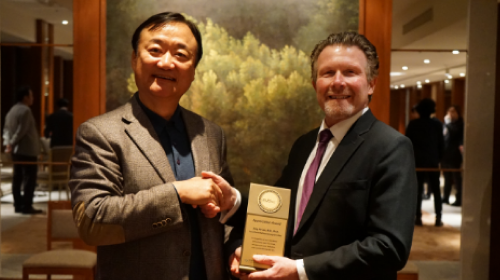
Dr. Jong-Ho Lee, Korea's Key Opinion Leader in ICL Lens Implantation
BGSS Eye Clinic, a pioneer in the history of ICL,
now leads a
new era with Presbyopia ICL.
Preserve Your Natural Eye Structure See Clearly
at Near, Intermediate, and Far Distances
EVO Viva ICL: Simultaneous Vision Correction and Presbyopia Solution
Unlike traditional multifocal lens implants that require the removal of the eye’s natural lens
or monovision techniques that correct each eye differently, EVO Viva ICL allows both eyes to see clearly at all distances.
Made of biocompatible Collamer material, EVO Viva ICL preserves the proven advantages
of conventional ICL while offering a safe, clinically-tested solution for presbyopia.
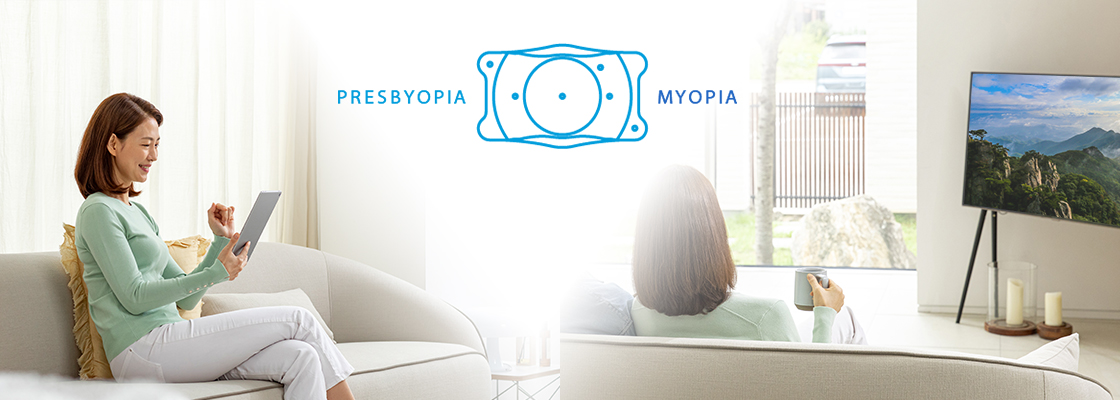
-
Simultaneous
vision correction
& presbyopia treatment -
Preservation of the
healthy natural lens -
Expanded eligibility
for surgery -
Option to remove
the lens if necessary
Eye Clinic Unveils Presbyopia Viva ICL Strategy
CEO Director Dr. Jong-Ho Lee, the first surgeon to perform Viva ICL surgery in Korea presents clinical results for two consecutive years.
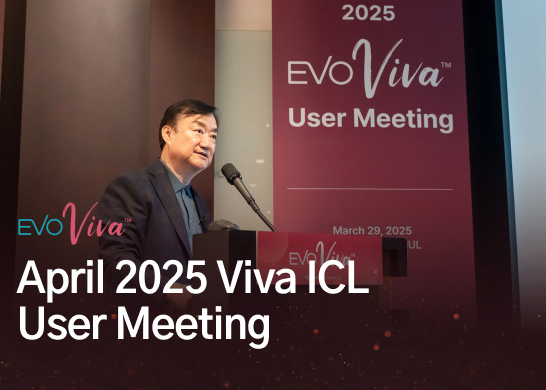
CEO Dr. Jong-Ho Lee, a key figure in the introduction and popularization of the ICL surgery domestically, was appointed as the ICL Instructor in 2006. He has also been selected as the first surgeon to perform the Viva ICL in Korea, accumulating clinical results from a variety of cases through his surgical expertise under delicate situations. The clinical results presented are the first in Korea to share actual surgical cases and clinical data based on precise examinations and meticulous surgical techniques, and to share experiences that lead research and education in the field of Viva ICL.
Clinical Results: 99% of Target Vision Achieved

More than 9 out of 10 Viva ICL surgery patients achieved vision sufficient for daily life without glasses, accurately achieving their target vision with a predicted correlation coefficient of 0.99. This presentation reveals various surgical cases, mix-and-match strategies with standard ICLs, and recommended conditions to increase success rate, ensuring reliable treatment and high surgical quality.
Presbyopia Viva ICL Clinical Results
Correlation Coefficient of 0.99 = Target Vision Achieved at 99%
IC vs. 1moCo (VIVA Group)
Intended Correction (IC)
accurately achieving preoperative target vision.
*The accuracy index shows how closely the preoperative target vision matches the postoperative vision.
Values closer to 1 indicate a perfect match with the actual result.
Over 98% Recover with Best Corrected Visual Acuity of 0.8 (20/25)
-
1 Month After Surgery
UCVA83%
Achieve Visual Acuity Over 0.8 (20/25)
-
3 Months After Surgery
BCVA98%
Achieve Visual Acuity Over 0.8 (20/25)
without glasses 3 months after surgery.
* This serves as an indicator to assess whether vision has been restored after surgery and ensures that no damage has occurred.
-

Proven Safety
Backed by over 20
years of global clinical experience, with more than 2 million ICL procedures performed worldwide. -

Dual Correction
Suitable for those
seeking vision
correction even
without cataract
progression,
addressing both
myopia and presbyopia. -

Preserves Eye Structure
Keeps the natural
lens intact and uses a posterior lens implantation technique that avoids damaging the iris. -

UV Protection
The UV-blocking lens
helps prevent
cataracts and macular degeneration.
-

Wide Range of Candidates
Suitable for patients
with thin corneas,
high myopia, and
even extreme myopia. -

Expertise at BGSS
High surgical
proficiency, precise
lens sizing, and a
system enabling
same-day bilateral
surgeries. -

Minimal
Dry EyeThe cornea is
preserved, reducing
the risk of post-op
dry eyes and glare. -

Postoperative Care
Systematic checkups
and a follow-up
warranty program
ensure long-term
results.
Presbyopia ICL Viva is a lens implantation procedure designed for individuals aged 40 and above. It allows for surgery without corneal reshaping, making it suitable for those with thin corneas, high or extreme myopia. This procedure can simultaneously correct presbyopia without the need for cataract surgery.
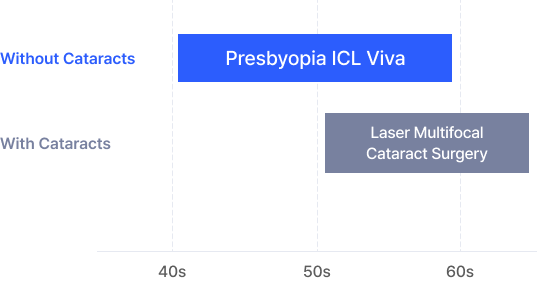
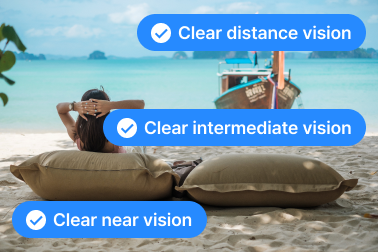
-
 Those over 40 seeking
Those over 40 seeking
vision correction -
 Those wishing to see up close
Those wishing to see up close
without reading glasses -
 Those who want to correct
Those who want to correct
presbyopia without undergoing
cataract surgery -
 Those desiring natural vision
Those desiring natural vision
correction for distance,
intermediate, and near vision
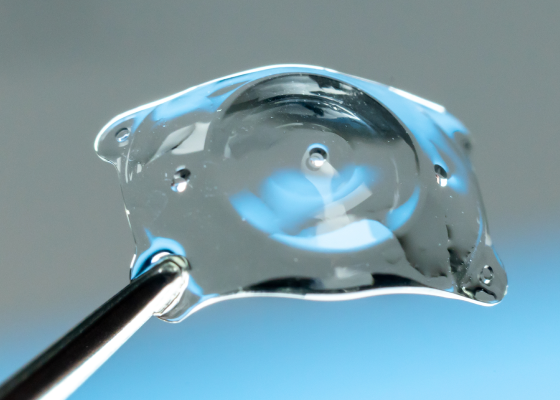
you can still qualify for the procedure.
EVO Viva does not involve corneal reshaping or lens removal,
enabling those with prior vision correction surgery to gain
additional vision enhancement and presbyopia correction.
Future cataract surgery remains an option as well.
Precautions
- Pre-Surgery Precautions
- Surgery-Day Precautions
- Post-Surgery Precautions
-
Lens Wear Please stop wearing contact lenses and bring your regular glasses when you visit.
Soft lenses for 1 week
Hard lenses for 1 week
Astigmatism correction soft lenses for 2 weeks
Ortho-K lenses for at least 4 weeks

-
Alcohol
Avoid consuming alcohol prior to surgery.

-
Bathing
Saunas and public baths can be resumed 2 months post-surgery, so it’s advisable to bathe beforehand.

-
Medication
Administer the prescribed eye drops to the eye designated for surgery starting 3 days before the procedure.
If you are taking diabetes or blood pressure medications, please continue to do so.
If you are on sedatives or antidepressants, examinations are possible, but consult with your doctor to confirm your eligibility for surgery.

-
Clothing
Please avoid skirts, turtlenecks, and hoodies to ensure comfort during the procedure.

-
Perms/Dyeing
You may have perms and hair dye treatments up to 2 weeks prior, so please arrange accordingly if needed.

-
Driving
You will not be able to drive post-surgery.
If you bring a car, make sure you have someone to drive you home.
-
Meal
Have a light breakfast (half a bowl of rice)

-
Beverage
Avoid caffeinated beverages like coffee and green tea.

-
Make-Up
Avoid wearing make-up, perfume, or hair spray on the day of surgery.

-
Before Entering
the Surgery RoomUse the restroom before entering the surgery room

-
Before the Surgery
Surgery is performed under local (eye drops) anesthetic.

-
During the Surgery
Relax, lie down comfortably, and focus on the light. Even though anesthetic eye drops are used to numb the eyes, you may feel slight pressure or coldness.

-
During the Surgery
Please notify the doctor if you feel any discomfort.

-
Immediately After
the SurgeryWe recommend you bring a guardian as it may be difficult to open the eyes due to tearing up, bloodshot eyes, or light sensitivity.

-
Surgery Day
We recommend you rest with your eyes closed.
Avoid force-closing or rubbing your eyes.
-
Use of Eye Drops
Use the prescription medications as indicated.

-
Pain
You might experience tearing up or slight pain around the eyes for 3~4 hours after the surgery.

-
Visual Recovery
There might be differences in vision between each eye during the recovery. Vision may appear hazy due to corneal swelling and will gradually recover over 2 to 3 months.

-
Protective Goggles
Goggles must be worn while sleeping during the first 2 weeks.
(It prevents accidental touching of the eye while sleeping)
-
Face Washing
Face washing and showing are allowed after 5 days. Be careful not to get soap or shampoo in the eyes. Public baths, sauna, and steam spa are allowed after 2 months

-
Make-Up
Basic skincare products are allowed after face washing, and eye make-up (eye shadow, mascara, eyeliner) is allowed after 1 month.

-
Perm/Dye
Hair perming and dyeing are allowed after 1 month.

-
Exercise
Light exercise (jogging, going for walks) is allowed after 2 weeks, and strenuous exercise (swimming, skiing) is allowed after 2 months.

-
Drinking/Smoking
Drinking is prohibited for 1 month, avoid over-drinking for 2 months.
Avoid smoking for at least 1 week.
(avoid enclosed areas)
-
Traveling
Allowed after 3-4 days but prevent any external shocks to the eye.

-
Driving
Be cautious for a few days after the surgery. Depending on the recovery rate, it is recommended to start driving at night after 1 to 2 weeks.

-
Daily Routine
Avoid rubbing or forcefully closing your eyes for the first week or two after the surgery. Avoid reading or watching TV for a prolonged time for a few days after the surgery. Be careful not to contract eye diseases such as eye infections within two months after the surgery.

